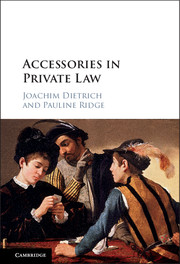Book contents
- Frontmatter
- Dedication
- Contents
- Foreword
- Preface
- Table of cases
- PART I General principles
- PART II Accessory liability in private law
- 5 Torts
- 6 Breach of contract
- 7 Infringement of equitable property rights
- 8 Breach of equitable duties
- 9 Infringement of statutory intellectual property rights
- 10 Other statutory wrongs
- 11 Wrongs involving companies
- PART III
- Index
6 - Breach of contract
from PART II - Accessory liability in private law
Published online by Cambridge University Press: 05 February 2016
- Frontmatter
- Dedication
- Contents
- Foreword
- Preface
- Table of cases
- PART I General principles
- PART II Accessory liability in private law
- 5 Torts
- 6 Breach of contract
- 7 Infringement of equitable property rights
- 8 Breach of equitable duties
- 9 Infringement of statutory intellectual property rights
- 10 Other statutory wrongs
- 11 Wrongs involving companies
- PART III
- Index
Summary
Overview
The tort of inducing breach of contract is committed when a defendant, A, induces or procures another (the contract breaker and primary wrongdoer, PW) to breach her contract with a claimant, C, causing damage. The acts constituting the inducement to breach must be done with knowledge of the contract, such that A intended, by his acts, to procure the breach. The tort owes its origins to the famous case of Lumley v. Gye, decided in 1853, in which the defendant lured an opera star away from a rival opera house in order to contract with him, although the claim in Lumley itself ultimately failed at trial. Examples of the tort include inducing a related company to terminate a contract with C to promote a sporting event; paying moneys to workers to allow them to continue unlawful strike action; a tenants’ association urging tenants not to pay rents in order to achieve its objectives; and a trade competitor engaging in unfair competition by poaching a rival's customers or employees. In this chapter, we use the label ‘A’ as our usual shorthand for accessory, albeit acknowledging that the accessorial nature of the inducing tort is disputed [6.2].
Some commentators question the need for a tort that further protects contracting parties, in addition to their contractual rights against breaching parties. Such a tort may stifle competition, for example, and there is clearly the need to balance defendants’ interests in freedom of action against claimants’ interests in the security of their contracts. There is, however, widespread support for the tort, albeit on a number of different rationales. These rationales include the protection of quasi-proprietary rights, that is, that contract rights are ‘a species of property’ protected by limited rights against non-contracting parties, economic efficiency and accessory liability principles. Much of the academic debate about the need for the inducing tort and, if such need exists, its rationale and justifiable limits, has occurred in the US, where formulation of the tort in the Restatement of Torts is considerably wider than in Anglo-Australian law. The broad formulation in the Restatement leads to uncertainty: merely interfering with the ‘performance’ of a contract so as to cause the performance to be ‘more expensive or burdensome’ can give rise to liability, provided such interference is intentional and improper.
- Type
- Chapter
- Information
- Accessories in Private Law , pp. 169 - 198Publisher: Cambridge University PressPrint publication year: 2016



